Charles E W Bean, Diaries, AWM38 3DRL 606/260/1 - 1916 - 1930 - Part 3
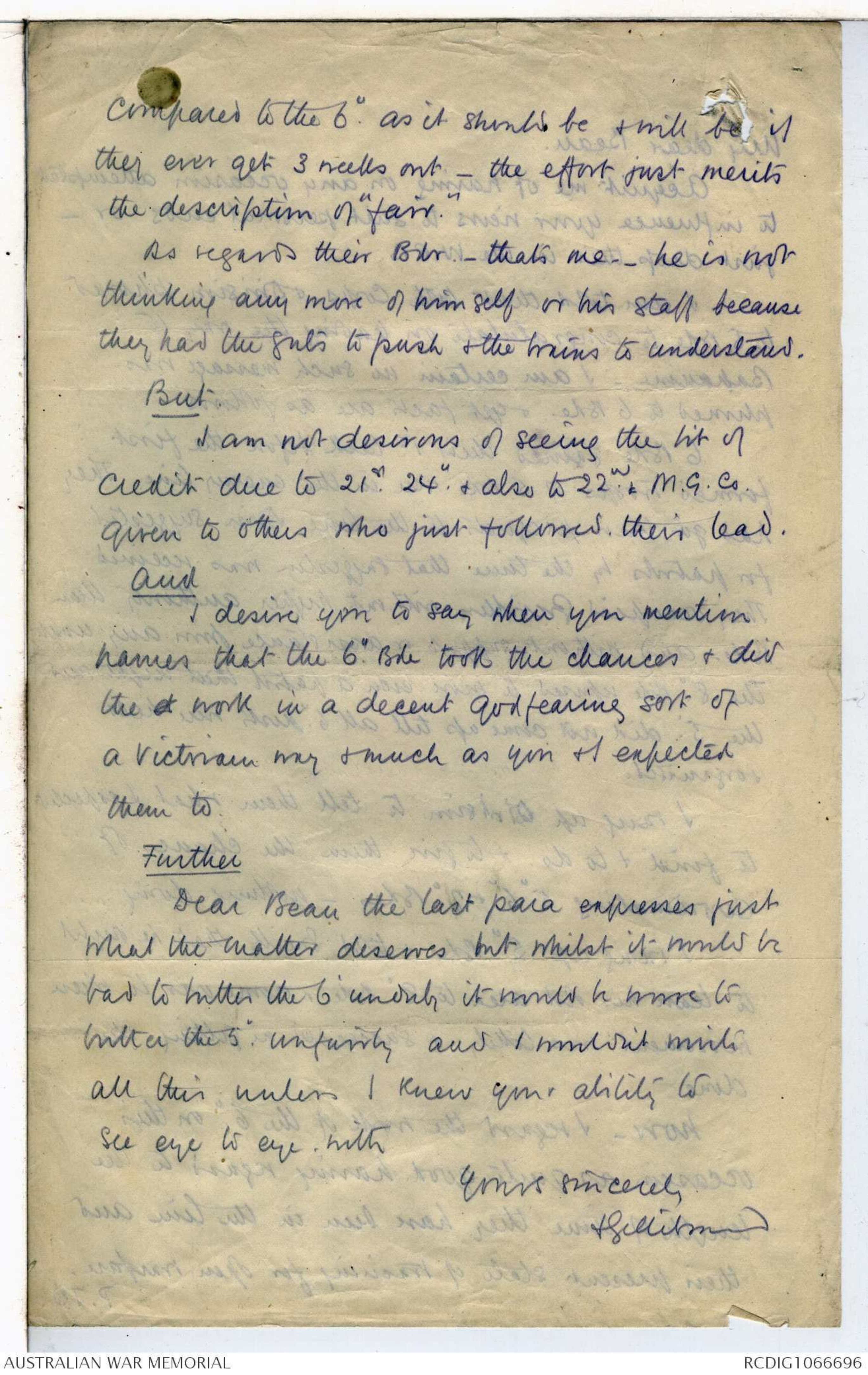
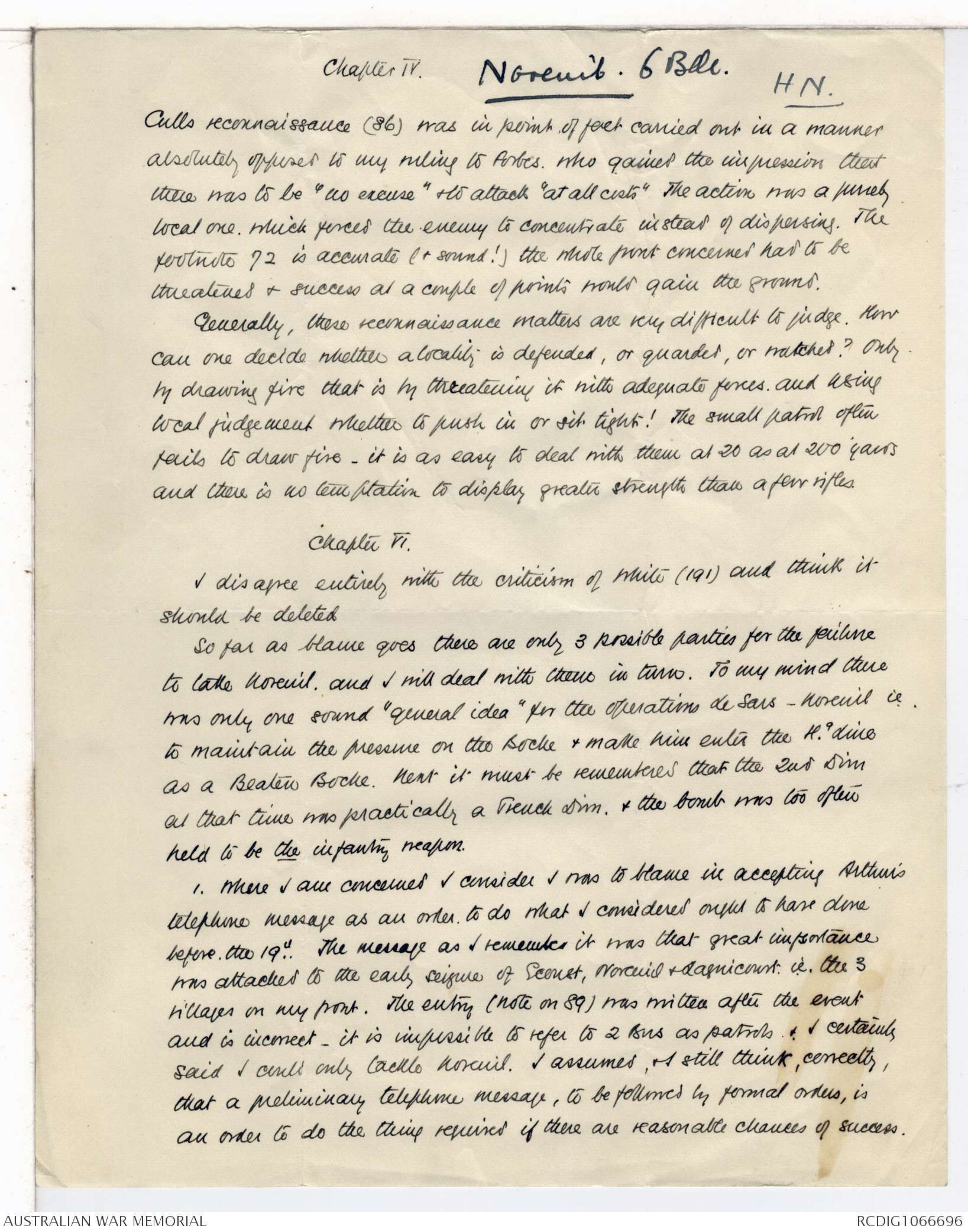
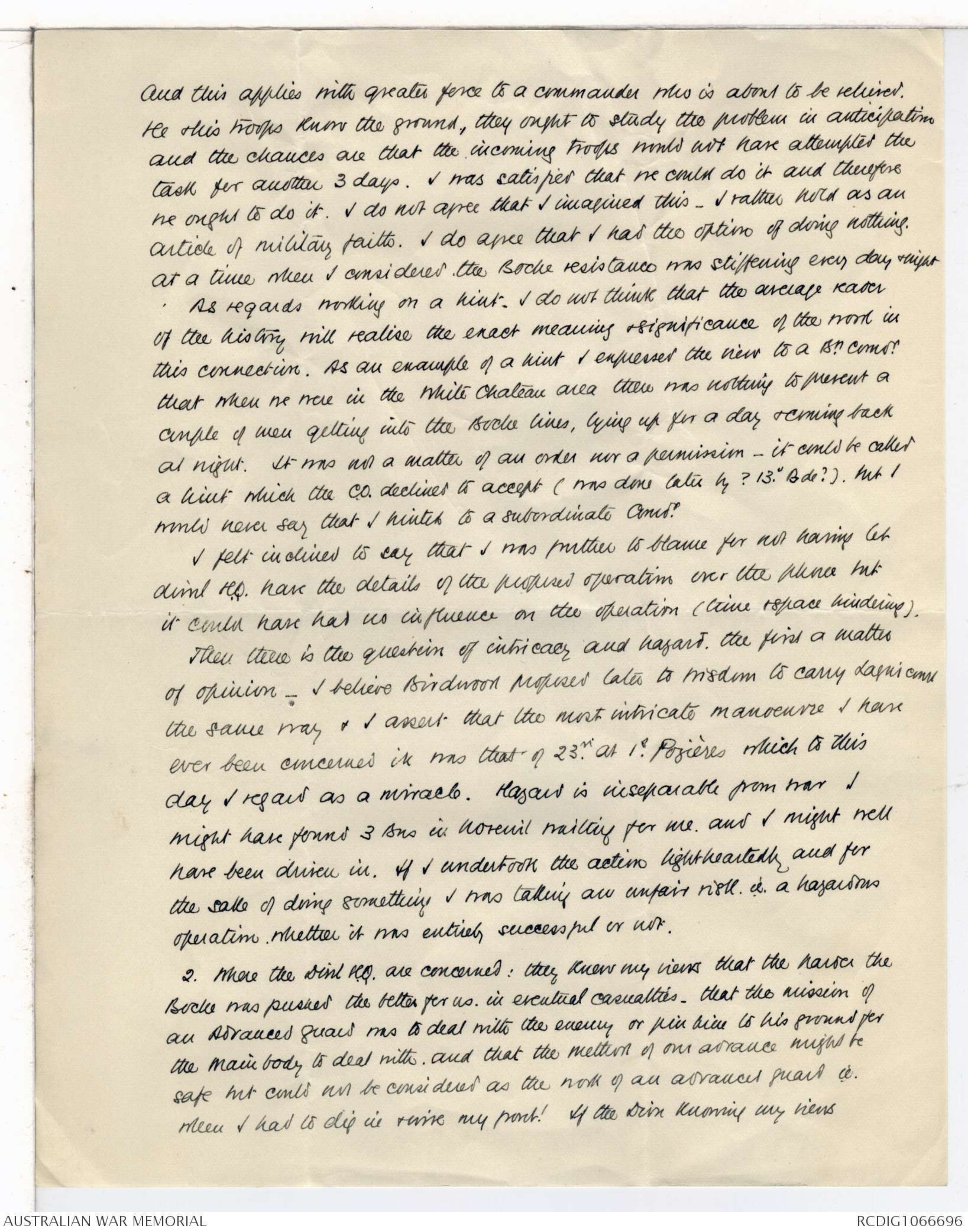
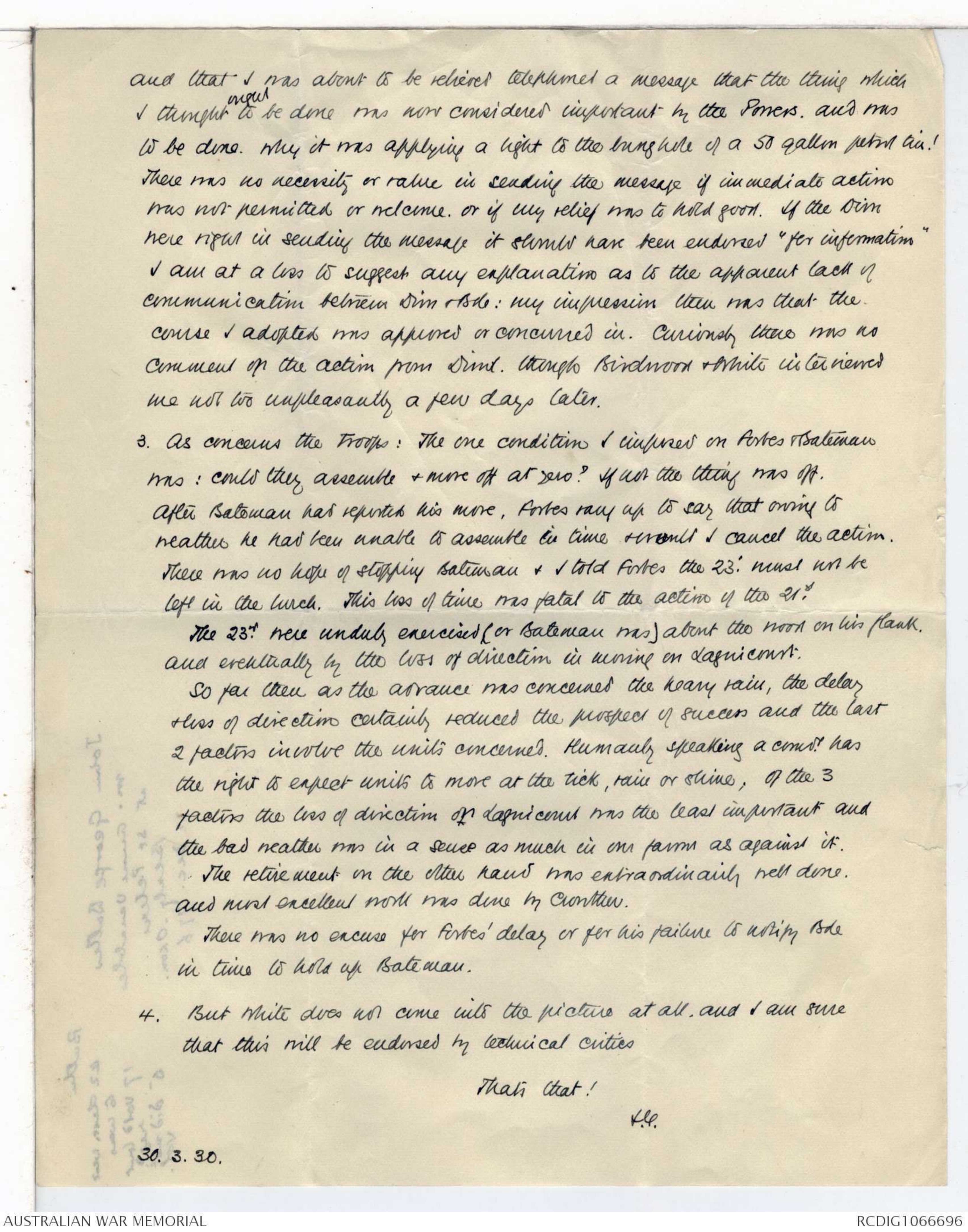
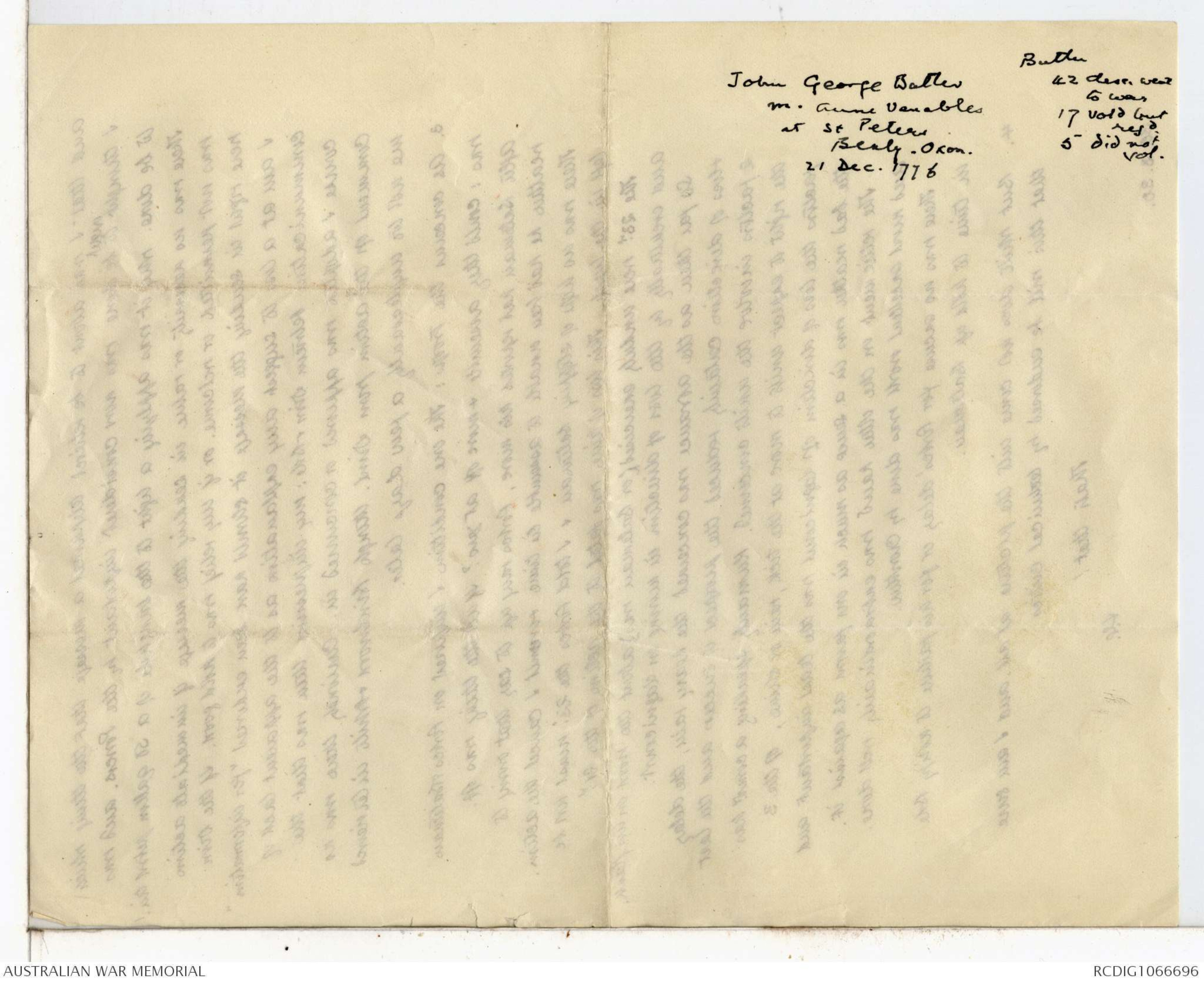
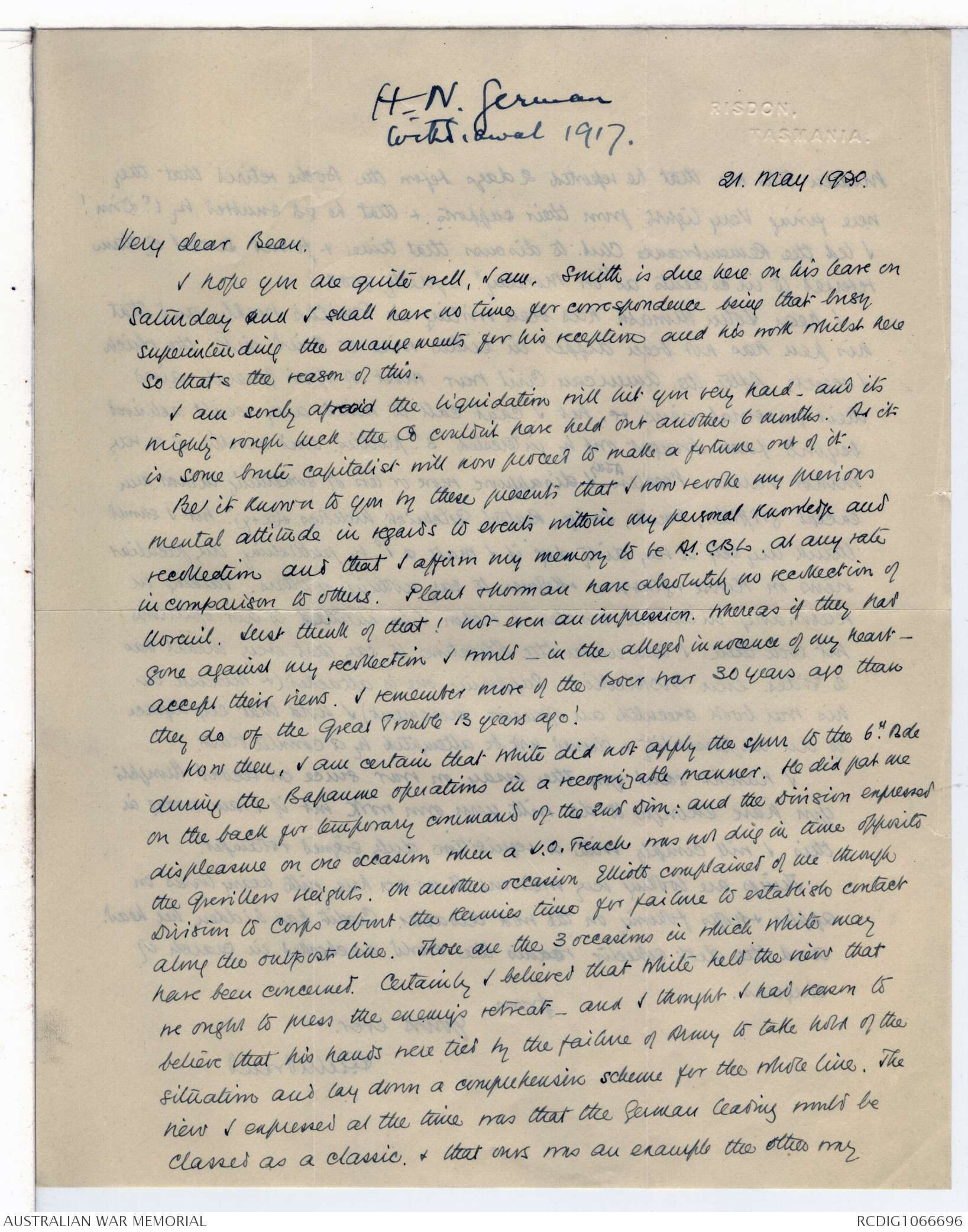
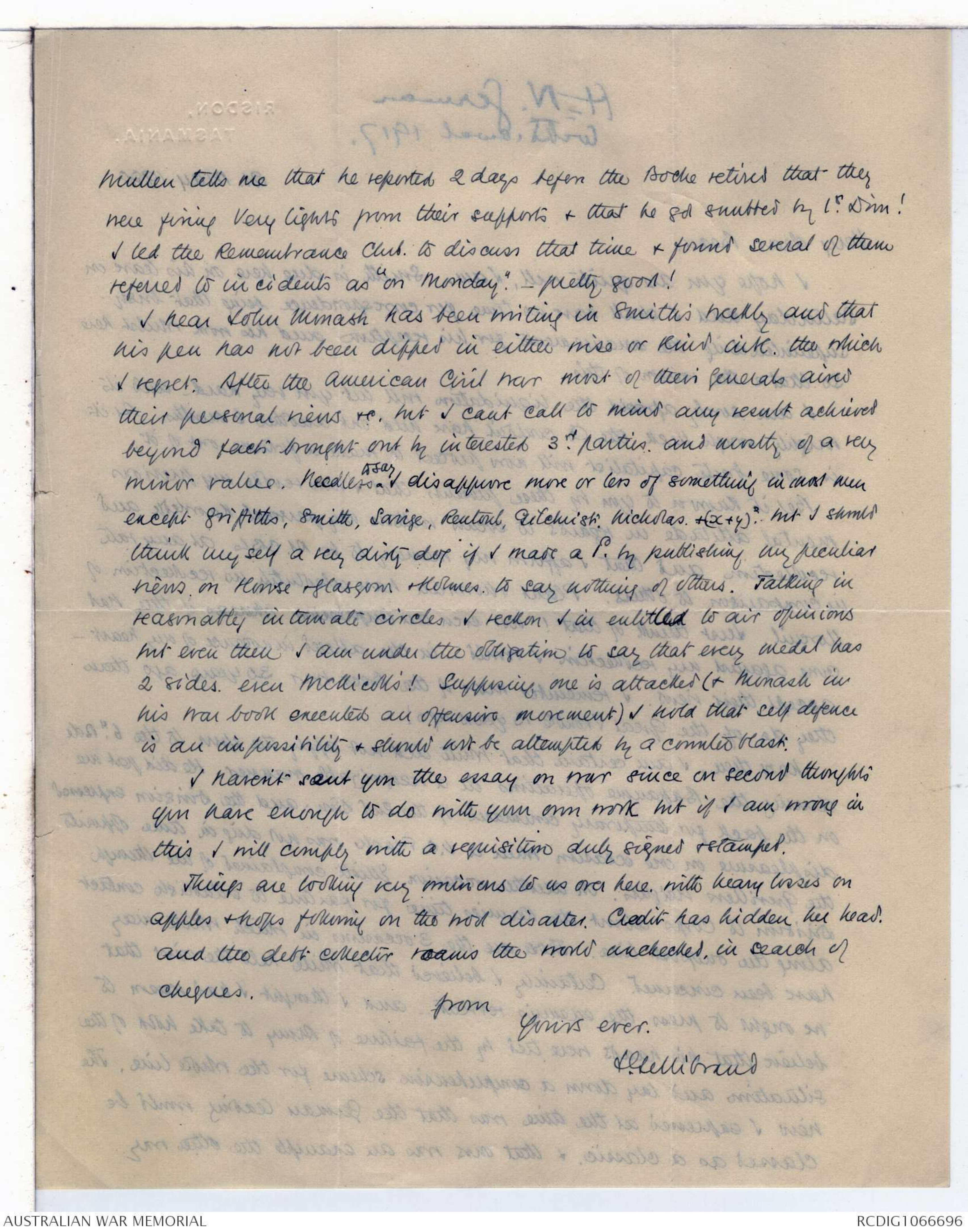
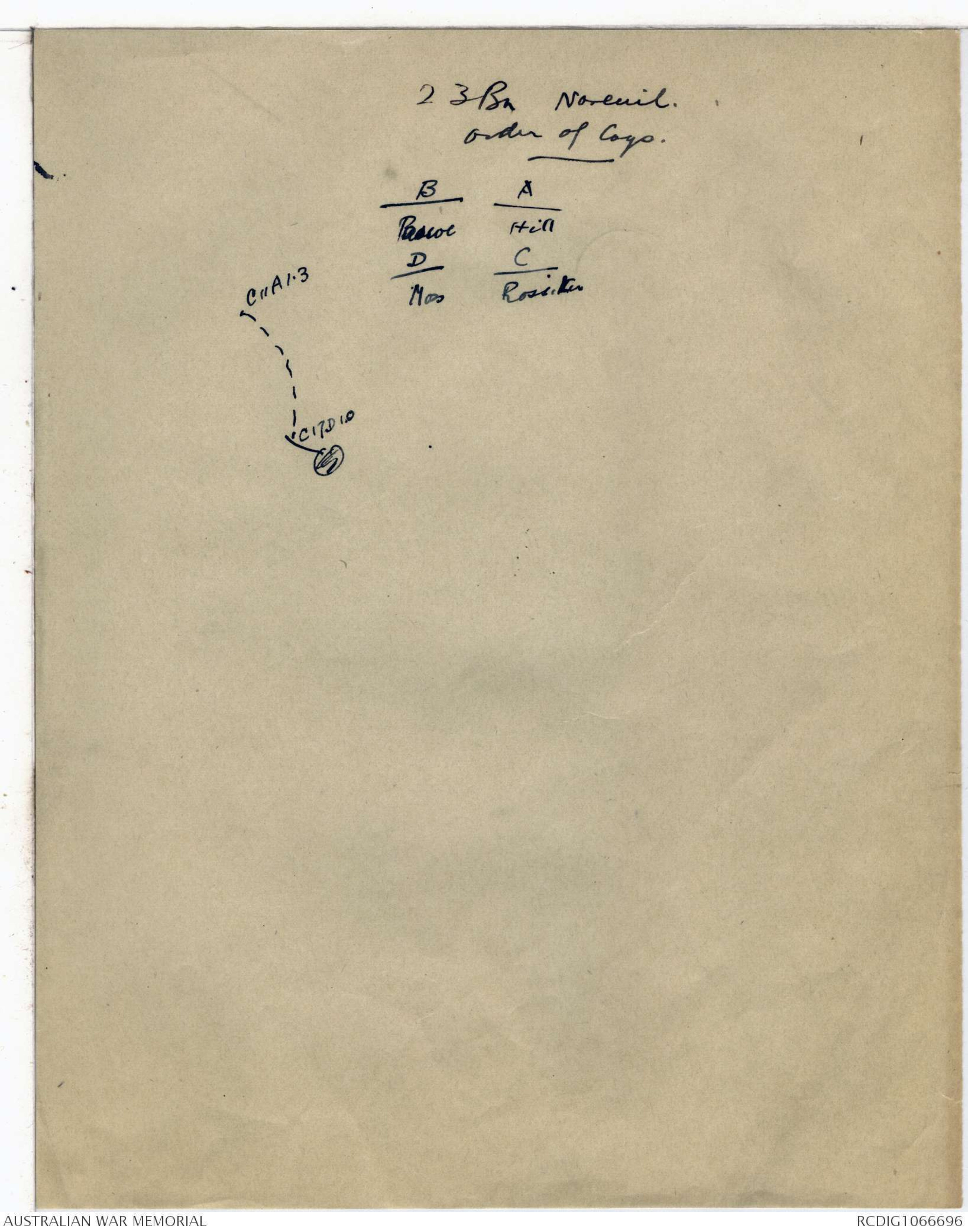
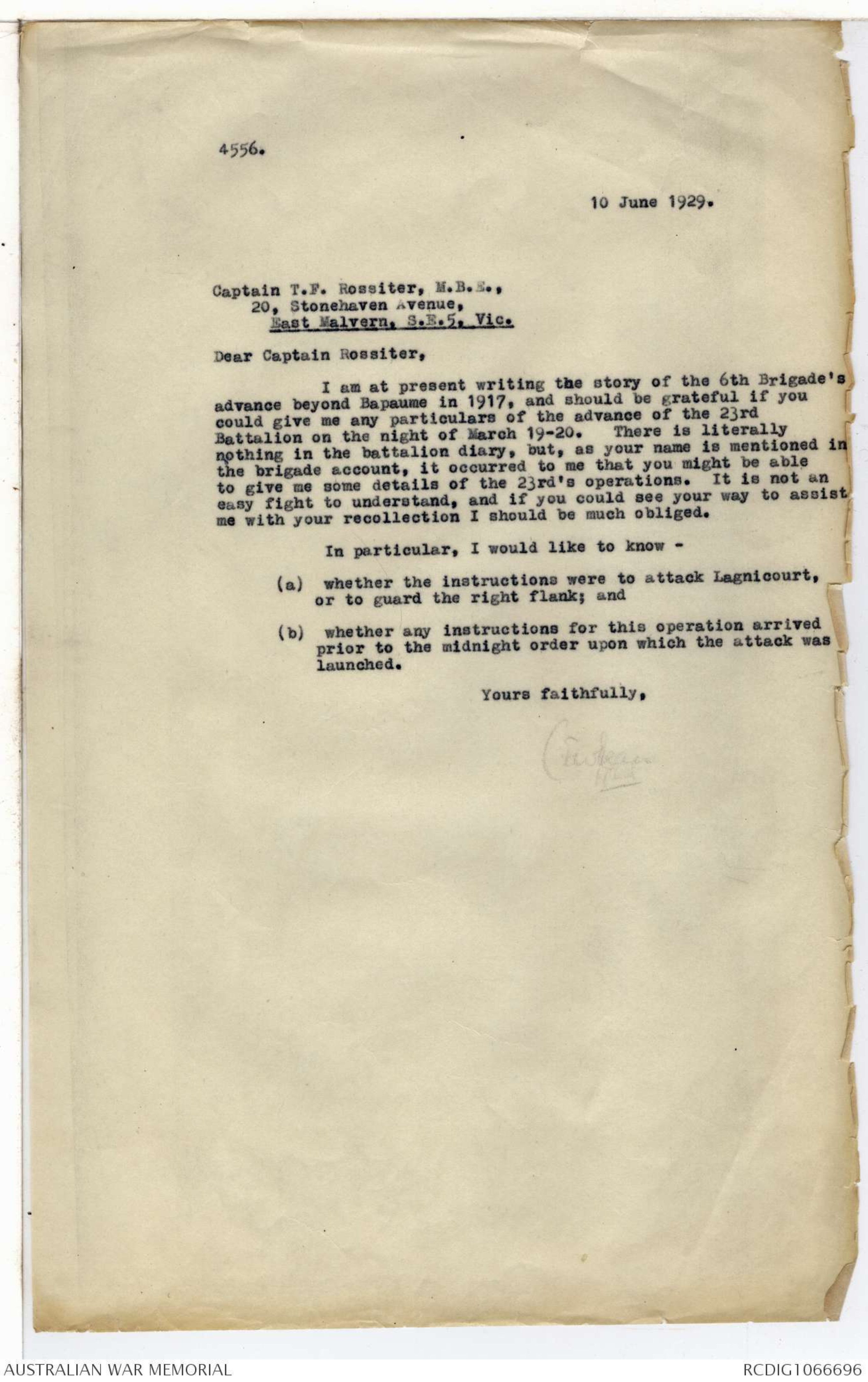
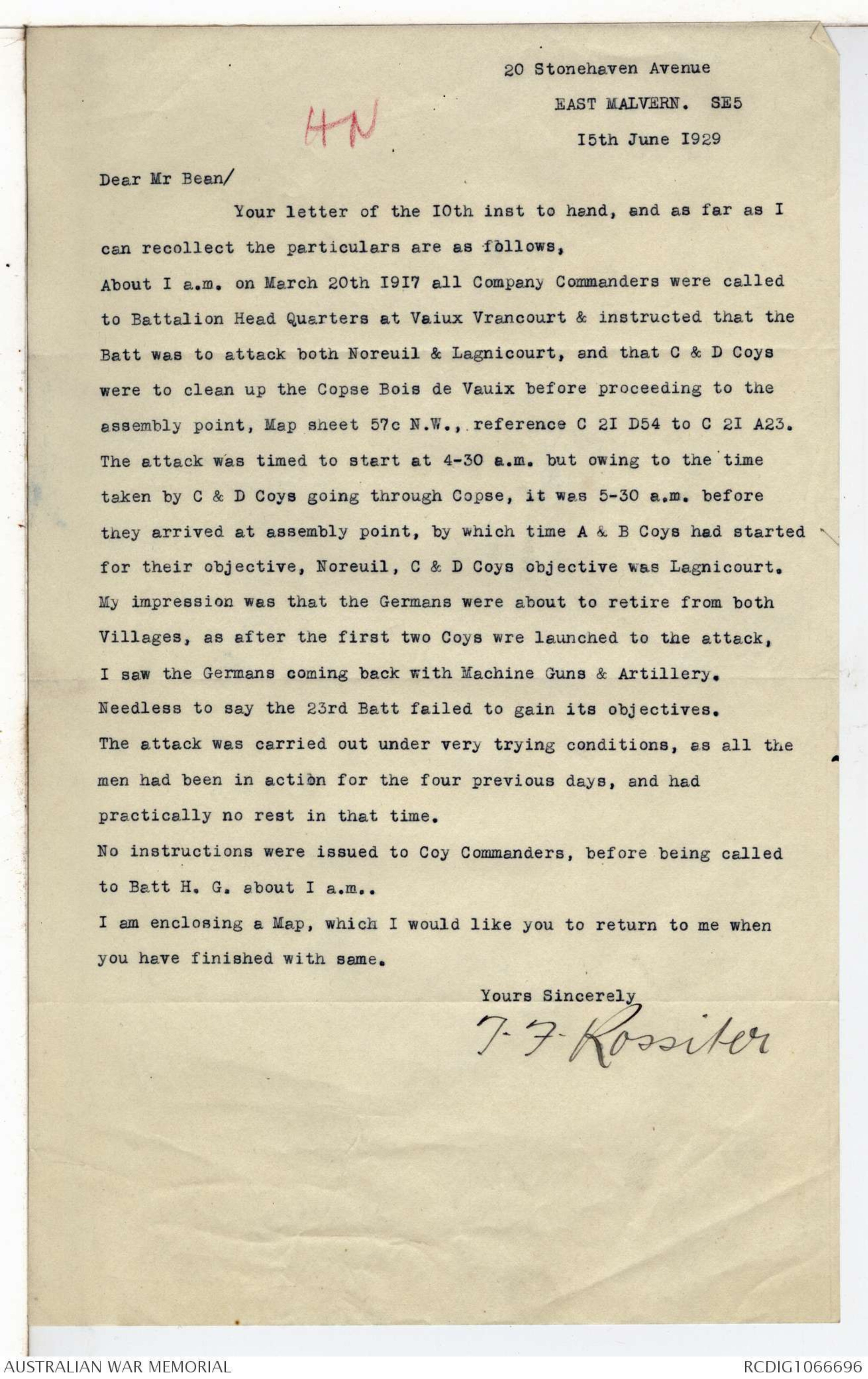
compared to the 6th as it should be & will be if
they ever get 3 weeks out - the effort just merits
the description of "fair".
As regards their Bdr. - that's me - he is not
thinking any more of himself or his staff because
they had the guts to push & the brains to understand.
But
I am not desirous of seeing the bit of
credit due to 21st. 24th & also to 22nd & M.G. Co.
given to others who just followed their lead.
And
I desire you to say when you mention
names that the 6th Bde took the chances & did
the at work in a decent god fearing sort of
a Victorian way & much as you & I expected
them to.
Further
Dear Bean the last para expresses just
what the matter deserves but whilst it would be
bad to batter the 6 unduly it would be worse to
batter the 5th unfairly and I wouldn't write
all this unless I knew your ability to
see eye to eye with
Yours sincerely
J Gellibrand
Chapter IV. Noreuil. 6 Bde. HN.
Culls reconnaissance (86) was in point of fact carried out in a manner
absolutely opposed to my ruling to Forbes. who gained the impression that
there was to be "no excuse" & to attack "at all costs" The action was a purely
local one. which forced the enemy to concentrate instead of dispersing. The
footnote 72 is accurate (& sound!) the whole front concerned had to be
threatened & success at a couple of points would gain the ground.
Generally, these reconnaissance matters are very difficult to judge. How
can one decide whether a locality is defended, or guarded, or watched? Only
by drawing fire that is by threatening it with adequate forces. and using
local judgement whether to push in or sit tight! The small patrol often
fails to draw fire - it is as easy to deal with them at 20 as at 200 yards
and there is no temptation to display greater strength than a few rifles.
Chapter VI.
I disagree entirely with the criticism of White (191) and think it
should be deleted
So far as blame goes there are only 3 possible parties for the the failure
to take Noreuil. and I will deal with them in turn. To my mind there
was only one sound "general idea" for the operation de Sars - Noreuil i.e.
to maintain the pressure on the Boche & make him enter the H.q line
as a Beaten Boche. Next it must be remembered that the 2nd Divn
at that time was practically a Trench Divn. & the bomb was too often
held to be the infantry weapon.
1. Where I am concerned I consider I was to blame in accepting Arthur's
telephone message as an order. to do what I considered ought to have done
before the 19th.. The message as I remember it was that great importance
was attached to the early seizure of Ecoust, Noreuil & Lagnicourt i.e. the 3
villages on my front. The entry (note on 89) was written after the event
and is incorrect - it is impossible to refer to 2 Bns as patrols & I certainly
said I could only tackle Noreuil. I assumed, & I still think, correctly,
that a preliminary telephone message, to be followed by formal orders, is
an order to do the thing required if there are reasonable chances of success.
and this applies with greater force to a commander who is about to be relieved.
He & his troops run the ground, they ought to study the problem in anticipation
and the chances are that the incoming troops would not have attempted the
task for another 3 days. I was satisfied that we could do it and therefore
we ought to do it. I do not agree that I imagined this - I rather hold as an
article of military faith. I do agree that I had the option of doing nothing.
At a time when I consider the Boche resistance was stiffening every day & night.
As regards working on a hint. I do not think that the average reader
of the history will realise the exact meaning & significance of the word in
this connection. As an example of a hint I expressed the view to a Bn. Comdr.
that when we were in the White Chateaux area there was nothing to prevent a
couple of men getting into the Boche lines, lying up for a day & coming back
at night. It was not a matter of an order nor a permission - it could be called
a hint which the C.O. declined to accept (was done later by ? 13th Bde?). But I
would never say that I hinted to a subordinate Comdr.
I felt inclined to say that I was further to blame for not having let
divnl H.Q. have the details of the proposed operation over the phone but
it could have had no influence on the operation (time & space hindering).
Then there is the question of intricacy and hazard, the first a matter
of opinion - I believe Birdwood proposed later to Wisdom to carry Lagnicourt
the same way & I assert that the most intricate manoeuvre I have
ever been concerned in was that of 23rd at 1st Pozières which to this
day I regard as a miracle. Hazard is inseparable from war I
might have found 3 Bns in Noreuil waiting for me and I might well
have been driven in. If I undertook the action lightheartedly and for
the sake of doing something I was taking an unfair risk i.e. a hazardous
operation. whether it was entirely successful or not.
2. Where the Divnl H.Q. are concerned: they knew my views that the harder the
Boche was pushed the better for us. in eventual casualties. that the mission of
an Advanced guard was to deal with the enemy or pin him to his ground for
for the main body to deal with and that the method of our advance might be
safe but could not be considered as the work of an advanced guard i.e.
when I had to dig in & wire my post! If the Divn knowing my views
and that I was about to be relieved telephoned a message that the thing which
I thought ∧ought to be done was now considered important by the powers. and was
to be done. Why it was applying a light to the bung hole of a 50 gallon petrol tin!
There was no necessity or value in sending the message if immediate action
was not permitted or welcome. or if my relief was to hold good. If the Divn
were right in sending the message it should have been endorsed "for information"
I am at a loss to suggest any explanation as to the apparent lack of
communication between Divn & Bde: my impression then was that the
course I adopted was approved or concurred in. Curiously there was no
comment on the action from Divnl. though Birdwood & White interviewed
me not too unpleasantly a few days later.
3. As concerns the troops: The one condition I imposed on Forbes & Bateman
was : could they assemble & move off at zero? If not the thing was off.
After Bateman had reported his move, Forbes rang up to say that owing to
weather he had been unable to assemble in time & would I cancel the action.
There was no hope of stopping Bateman & I told Forbes the 23'. must not be
left in the lurch. This loss of time was fatal to the action of the 21st.
The 23rd were unduly exercised (or Bateman was) about the wood on his flank.
and eventually by the loss of direction in moving on Lagnicourt.
So far then as the advance was concerned the heavy rain, the delay
& loss of direction certainly reduced the prospect of success and the last
2 factors involve the units concerned. Humanly speaking a comdr. has
the right to expect units to move at the tick, rain or shine, of the 3
factors the loss of direction of Lagnicourt was the least important and
the bad weather was in a sense as much in our favour as against it.
The retirement on the other hand was extraordinarily well done.
and most excellent work was due by Crowther.
There was no excuse for Forbes' delay or for his failure to notify Bde
in time to hold up Bateman.
4. But White does not come into the picture at all and I am sure
that this will be endorsed by technical critics.
That's that!
J.G.
30.3.30.
John George Butler
m. Anne Venables
at St Peters
Bealy. Oxon.
21 Dec. 1776
Buther
42 desc. went
to war
17 vold but
regd.
5 did not vol.
H.N. German
Withdrawal 1917.
21. May 1930.
Very dear Bean.
I hope you are quite well, I am. Smith is due here on his leave on
Saturday and I shall have no time for correspondence being that busy
superintending the arrangements for his reception and his work whilst here
so that's the reason of this.
I am sorely afraid the liquidation will hit you very hard - and its
mighty rough luck the Co couldn't have held out another 6 months. As it
is some brute capitalist will now proceed to make a fortune out of it.
Be it known to you by those present that I now revoke my previous
mental attitude in regards to events without my personal knowledge and
recollection and that I affirm my memory to be A.I. C.B.L. at any rate
in comparison to others. Plant & Norman have absolutely no recollection of
Noreuil. Just think of that! Not even an impression. Whereas if they had
gone against my recollection I would - in the alleged innocence of my heart -
accept their views. I remember more of the Boer War 30 years ago than
they do of the Great Trouble 13 years ago!
Now then, I am certain that White did not apply the spur to the 6th. Bde
during the Bapaume operations in a recognizable manner. He did pat me
on the back for temporary command of the 2nd Divn. and the Division expressed
displeasure on one occasion when a D.O. Trench was not dug in time opposite
the Guerillers Heights. On another occasion Elliott complained of me through
Division to Corps about the Reimies time for failure to establish contact
along the outpost line. Those are the 3 occasions in which White may
have been concerned. Certainly I believed that White held the view that
we ought to press the enemy's retreat - and I thought I had reason to
believe that his hands were tied by the failure of Army to take hold of the
situation and lay down a comprehensive scheme for the whole line. The
view I expressed at the time was that the German leaving would be
classed as a classic & that ours was an example the other way
Muller tells me that he reported 2 days before the Boche retired that they
were firing Very lights from their supports & that he got snubbed by 1st Divn!
I led the Remembrance Club. to discuss that time & found several of them
referred to incidents as "on Monday". -pretty good!
I hear John Monash has been writing in Smith's weekly and that
his pen has not been dipped in either wise or fluid ink, the [[??which]]
I regret. After the American Civil war most of their Generals aired
their personal news &c but I cant call to mind any result achieved
beyond facts brought out by interested 3rd . parties. and mostly of a very
minor value. Needless ^to say I disapprove more or less of something in most men
except Griffiths, Smith, Sanige, Rentoul Gilchrist, Nicholas, +(x + y)2 .. but I should
think myself a very dirty dog if I made a [[shorthand]] by publishing my peculiar
views on Howse & Glasgow & Holmes to say nothing of others. Talking in
reasonably intimate circles, I reckon I am entitled to air opinions
but even then I am under the obligation to say that every medal has
2 sides, even McNicholl's ! Supposing one is attacked ( & Monash in
his war book executed an offensive movement) I hold that self defence
is an impossibility & should not be attempted by a counter blast.
I haven't sent you the essay on war since on second thoughts
you have enough to do with your own work but if I am wrong in
this I will comply with a requisition duly signed & stamped.
Things are looking very ominous to us over here. with heavy losses on
apples and hops following on the rot disaster. Credit has hidden her head.
and the debt collector roams the world unchecked, in search of
cheques.
from
Yours ever,
J. Gellibrand
23Bn Noreuil
Order of Coys.
B A
Pascoe Hill
D C
Moss Rossiter
Diagram -see original document
4556.
10 June 1929.
Captain T. F. Rossiter, M.B.E.,
20, Stonehaven Avenue,
East Malvern, S.E.5. Vic.
Dear Captain Rossiter,
I am at present writing the story of the 6th Brigade's
advance beyond Bapaume in 1917, and should be grateful if you
could give me any particulars of the advance of the 23rd
Battalion on the night of March 19-20. There is literally
nothing in the battalion diary, but, as your name is mentioned in
the brigade account, it occurred to me that you might be able
to give me some details of the 23rd's operations. It is not an
easy fight to understand, and if you could see your way to assist
me with your recollection I should be much obliged.
In particular, I would like to know -
(a) whether the instructions were to attack Lagnicourt,
or to guard the right flank; and
(b) whether any instructions for this operation arrived
prior to the midnight order upon which the attack was
launched.
Yours faithfully,
C.E.W. Bean
[[?]]
20 Stonehaven Avenue
EAST MALVERN. SE5
15th June 1929
H N
Dear Mr Bean/
Your letter of the 10th inst to hand, and as far as I
can recollect the particulars are as follows,
About 1 a.m. on March 20th 1917 all Company Commanders were called
to Battalion Head Quarters at Vaiux Vrancourt & instructed that the
Batt was to attack both Noreuil & Lagnicourt, and that C & D Coys
were to clean up the Copse Bois de Vauix before proceeding to the
assembly point, Map sheet 57c N.W., reference C 21 D54 to C 21 A23.
The attack was timed to start at 4-30 a.m. but owing to the time
taken by C & D Coys going through Copse, it was 5-30 a.m. before
they arrived at assembly point, by which time A & B Coys had started
for their objective, Noreuil, C & D Coys objective was Lagincourt.
My impression was that the Germans were about to retire from both
Villages, as after the first two Coys were launched to the attack,
I saw the Germans coming back with Machine Guns & Artillery.
Needless to say the 23rd Batt failed to gain its objectives.
The attack was carried out under very trying conditions, as all the
men had been in action for the four previous days, and had
practically no rest in that time.
No instructions were issued to Coy Commanders, before being called
to Batt H.G. about 1 a.m. .
I am enclosing a Map, which I would like you to return to me when
you have finished with same.
Yours sincerely,
T. F. Rossiter
 Maralyn K
Maralyn KThis transcription item is now locked to you for editing. To release the lock either Save your changes or Cancel.
This lock will be automatically released after 60 minutes of inactivity.